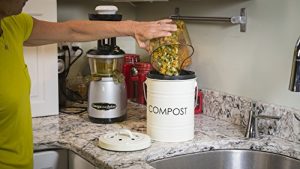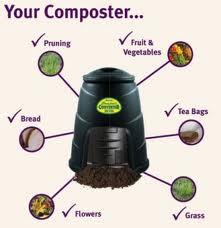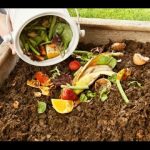Some food waste is inevitable, but you can keep this out of the waste stream with very little effort.
Composting Your Own Food Waste at Home
Composting is great for the environment. Watch this inspiring and entertaining seven-minute video: “The Compost Story”
Some food waste is inevitable, but you can keep this out of the waste stream with a home compost bin. At the same time, you will be making great organic fertilizer for your garden and flower beds. And it’s very easy to do. Let’s start with a few basics:
Some Do’s and Don’ts:
Please note that some of the food waste not compostable at home (such as meat, bones, fish, dairy) can be dropped off at the RTS food scrap collection. Click here for details
|
DO COMPOST
|
DON’T COMPOST
|
|
Why can’t you compost
|
Inside Your Kitchen:
- Get a medium-sized (1 gallon or slightly smaller) container with a cover to collect your daily food scraps.

- Place it next to your sink
- When full, empty it into your compost pile
- You will quickly get into the composting habit!
Greens vs Browns:
- You need the correct balance of “greens” and “browns” in your compost pile – twice as much “browns” as “greens” is about right. Otherwise, the pile might smell and it won’t be a great fertilizer for your garden.
- “Greens” are your kitchen waste and grass clippings
- “Browns” are leaves, used paper napkins/towels, pizza boxes or other slightly soiled cardboard, etc.
Volume:

- The bigger the volume, the quicker it is to make compost
Aerating:
- You need to turn your pile periodically with a shovel or pitchfork to aerate it
- Your pile should be wet, but not soggy
Your Compost Pile:
- Your compost pile can have many different forms, such as:
- a plastic compost container. Composting bins are sometimes available for purchase at the RTS; call first: 781-455-7568. They are also sold at stores such as Home Depot and Lowe’s

- a circular container made of chicken wire
- several connected/adjacent wood/wire bins
- a cover of some type is needed to keep critters out of your compost
- a plastic compost container. Composting bins are sometimes available for purchase at the RTS; call first: 781-455-7568. They are also sold at stores such as Home Depot and Lowe’s
- For the highest quality compost, it’s helpful to have 3 piles going at once:
- a pile you are adding new materials to
- a pile “still cooking”
- a pile that is done/ready to use
Love the idea of home composting, but don’t want to do it yourself or want to compost everything, not just fruits and veggies – see “Alternatives to Composting Your Food Waste at Home” page for more information.
Resources:


